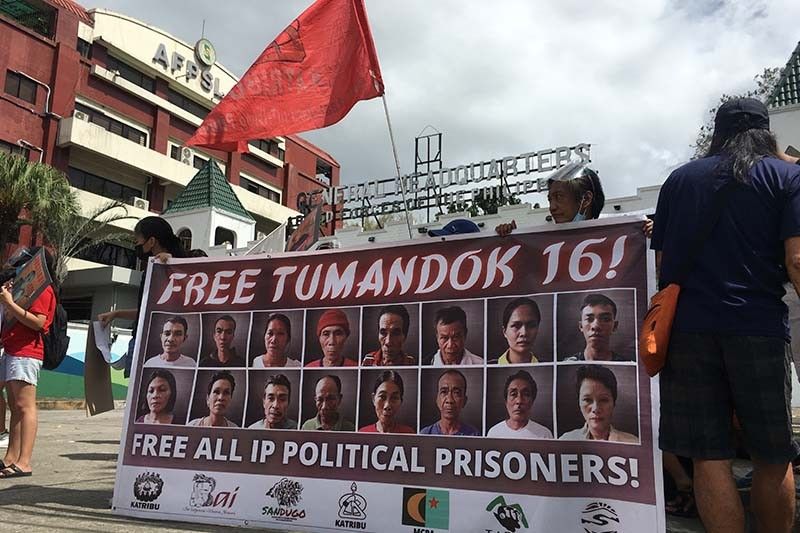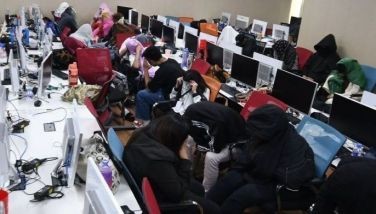Amnesty International calls for end to attacks vs indigenous peoples

MANILA, Philippines — A human rights watchdog called on the Philippine government to end the violence perpetrated against indigenous peoples and ensure their protection following a series of escalating attacks targeting them.
In a statement Thursday, Amnesty International said it is “deeply alarmed” by a spate of attacks against indigenous peoples, citing the arrest and detention of two Aeta farmers, the “shoot-to-kill” order against a rights activist in Cordillera and the massacre of nine Tumandok leaders.
“The organization calls on the Philippine government to put a stop to violence, arrests and harassment perpetrated against indigenous peoples. The government should launch prompt and impartial investigations into these attacks, and prosecute and bring to justice those found responsible in proceedings in line with human rights standards regarding due process,” Amnesty International said.
“It also should take concrete steps to ensure the protection, security and well-being of all indigenous peoples, including those risking their lives to call attention to human rights violations in their communities and fight for indigenous peoples’ rights,” it added.
Aeta farmers
Amnesty International said it s “deeply concerned” that the terrorism charges against Aeta farmers Japer Gurung and Junior Ramos “may be trumped up.”
The two farmers, considered to be the first to be charged under the Anti-Terrorism Act, said they were detained for six days and said they were tortured and made to confess to being members of the New People’s Army.
Solicitor General Jose Calida, at Tuesday’s resumption of oral arguments, made a manifestation that Gurung and Ramos were withdrawing their petition-in-intervention submitted last week with the assistance of the National Union of People’s Lawyers. Calida claimed the two were “forced” to sign the petition-in-intervention.
The Supreme Court unanimously denied the farmers’ petition.
NUPL-Central Luzon said its lawyers are still the counsels on record of the Aeta farmers.
‘Shoot-to-kill’ order
The organization also said that the murder charge against Windel Bolinget, chairperson of the Cordillera Peoples Alliance, “may be politically motivated and part of a well-established pattern of harassment by the Philippine authorities against them.”
Last month, Police Brig. Gen. R’win Pagkalinawan, Cordillera police chief, issued a “shoot-to-kill order” for Bolinget should the human rights activist resist arrest for the said charge. Following the issuance of the threat, Bolinget turned himself over to the National Bureau of Investigation for custody and protection.
In 2018, the CPA chair, along with other human rights defenders, was included in a list of names that authorities sought to declare as terrorists. The names were eventually removed.
“The organization calls for the murder charge against Windel Bolinget to be dropped, unless there is credible evidence against him. The ‘shoot-to-kill’ order against him must be also withdrawn and investigated, and those responsible for this grievous threat held responsible,” Amnesty International said.
Tumandok killings
The watchdog also urged the government to investigate independently and effectively the killing and detention of Tumandok leaders in Capiz and Iloilo and prosecute those found to have committed human rights violations.
On December 30, nine leaders of the Tumandok tribe were killed in combined police and military operations, while several other community members were arrested over alleged illegal possession of firearms, ammunition and explosives.
According to groups, Tumandok leaders were opposed to the construction of the Jalaur megadam in Iloilo, which would submerge their ancestral lands. Members of the tribe were also being tagged as supporters and members of communist rebel groups.
In 2007, the Philippines voted for the adoption of the UN Declaration on the Rights of Indigenous Peoples. The group urged the Duterte administration to keep its commitments under the declaration.
Dangers of red-tagging
Amnesty International stressed that prior to being killed or arrested and detained, those involved in the three cases had been red-tagged by the government
Red-tagging has increasingly been used by officials under the Duterte administration, including Lt. Gen. Antonio Parlade Jr., commander of the military’s Southern Luzon command and the spokesperson of the National Task Force to End Local Communist Armed Conflict. Parlade is now being investigated over his red-tagging spree.
“The organization reiterates that simply believing in communism as an ideological stance is not a criminal act under domestic law and cannot be used as a justification to target any individual or group,” Amnesty International said.
A report of the United Nations Office of the High Commissioner for Human Rights released in June 2020 that red-tagging “has posed a serious threat to civil society and freedom of expression.”
- Latest
- Trending
































